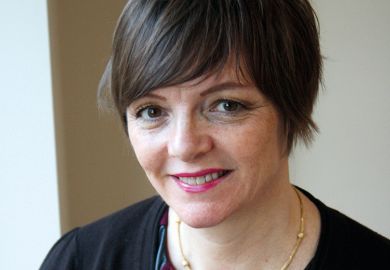Veronica Fynn Bruey became a refugee as a result of the Liberian civil war. She gained bachelor’s degrees at the University of Ghana, the University of British Columbia and the University of London, with her postgraduate degrees including a PhD in law from the Australian National University. She co-edited Deadly Voyages: Migrant Journeys across the Globe (2019) and is working on a book about patriarchy and gender in Africa. She is now an affiliated faculty member at Seattle University School of Law and an associate of the University of London’s Refugee Law Initiative.
Where were you born?
Monrovia, Liberia.
How did you first get caught up in the violence of the war there?
On 2 July 1990, we had woken up to a “normal” day. We had stopped going to school because the rebels were approaching the city; there was no fuel for taxis and minibuses to run on, so our school principal said we should not come back to school until further notice. We did some clothes washing and my mother was hanging them on the line to dry outside. I remember her saying she was going to town to “hustle” (to find food by whatever means for us to store up before the war got worse). I bless that day that Mother never left. Many parents who left for town that day did not return because Duport Road, where we lived then, was attacked by Charles Taylor’s rebels [Taylor later became Liberian president]. For 24 hours we were shelled with missiles, grenades, mortar guns and stray bullets flying all over the place. We finally came out of our house when we heard a loud bang, bang, bang. It was the rebels.
How did you reach the University of Ghana?
To be admitted to a university in Ghana, you must complete your Ordinary and Advance levels. My O-level journey at the Tema Methodist Day Secondary School was a total struggle, as many days I went hungry with little or nothing to eat. My additional maths teacher, Mike Gbinu, paid the registration fees for me to sit the O-level exams. Bob Millikin at the Action Chapel in Ghana paid all boarding and registration expenses for me to start my A levels at Mfantsiman Girls’ Secondary School. I had written to the church welfare department to assist me. Bob Millikin continued to help me financially to finish my studies at the University of Ghana.
What kind of student were you?
I have always been studious and diligent. I am also meticulous and a go-getter. I saw my mother struggle to raise eight children on her own. She often said, “Do not end up like me.” I hated it when I had to help her look after my siblings at a very young age or sell pastries in school during recess, when all my friends were playing.
What was your most memorable moment at university?
Playing sports. I was the female basketball captain at Ghana. I competed in ping-pong, volleyball, 100 metres [and] hurdles, long jump, and 4x400 [relay].
To what extent have your early experiences shaped your life as academic and advocate?
A great deal. My academic choices are intertwined with my lived experiences. My bachelor’s in psychology emphasis was on child development and trauma. My master’s in public health dissertation focused on refugee mental health. My master’s in law thesis was on protecting internally displaced persons. My PhD dissertation focused on systematic violence against indigenous girls and women.
You have said that though you have “six academic degrees from prestigious universities across four continents”, you have often been told, “usually by white males, that I wasn’t good enough”. What kind of experiences were you referring to?
When I was a refugee in Ghana, I was told several times that “you will never amount to anything”…In Canada, a supervisory team told me I was not a “PhD product”, that I wasn’t “cut out for academia” and would be “better off advocating for refugees in a small NGO or something”. In the US, with almost six degrees, I was told I am not qualified to teach in law schools. In Australia, it was even worse. It took three years to confirm my dissertation after it was submitted, partly because one of the three examiners had “issues” with it.
Do you feel that many in the academy are unable to accept the value of “lived experience” such as yours?
Oh yes! Emphatically. Many in the academy, especially in the West, will never have the kind of experience I have had. So, rather than embracing the uniqueness and learning from the experience, they use dominant Western conventions in academia as a tool of oppression, exclusion and discrimination.
What was your response?
Barely a year after arriving in Canada, I started Africa Awareness at the University of British Columbia to educate faculty, students and staff members by institutionalising African studies in the university’s academic curriculum. Africa Awareness emphasised Africa’s intelligentsia beyond the narrowed perception that being African is all about drumming, dancing, food and wearing brightly coloured clothes.
Can you say something about the Voices of West African Refugees (VOWAR) group you founded?
The main purpose of VOWAR is “to unify refugees in the West African region and ensure that their voices are heard by supporting their health, well-being, development, and growth”.
Do you see any tensions in combining the roles of academic and advocate?
For me, there is no tension there. I get frustrated when the dominant Western academics create a dichotomy between academia and advocate. In actual fact, they see the advocate role as less valuable and more subjective than the academic one. I will never understand why I should pretend to treat my lived experience as a war survivor differently from my acquired scholarly knowledge.
What are your main interests and pleasures outside work?
Reading, dancing and running. I run between 30 and 50 kilometres per week. My goal is to do a marathon.
Tell us about someone you’ve always admired.
My mother. She told me never to end up like her. I didn’t have eight children as a single mum, yet I am so much like my mother. Resilient, feisty, disciplined, hard-working, athletic and bubbly. We both wear our hearts on our sleeves.
What would you like to be remembered for?
As a person who was passionate about girls’ education.
matthew.reisz@timeshighereducation.com
Appointments
James Tooley will be the next vice-chancellor of the University of Buckingham. He is currently pro vice-chancellor (academic) at the institution and was previously professor of education policy at Newcastle University. Professor Tooley will take up the role when Sir Anthony Seldon leaves the university on 1 October. Rory Tapner, chair of council, said Professor Tooley “has made a great contribution to university life since joining us in Buckingham. He is wonderfully experienced in driving forward innovative education models, and as pioneers of the two-year degree, innovation is something Buckingham takes seriously.”
Anthony Finkelstein has been appointed the next president of City, University of London. He will join the university next year from his position as the UK government’s chief scientific adviser for national security, and his research is based at the Alan Turing Institute. Previously he was dean of the UCL Faculty of Engineering Sciences and head of computer science at UCL. Julia Palca, chair of City’s council, said the institution believes “that his knowledge and experience, together with his engaging and inclusive personality, will help us create a City for the future, which will be a great place to study and to conduct research”.
Amy Kirschke is joining Virginia Tech’s School of Visual Arts as director. She joins from the University of North Carolina Wilmington, where she is currently a professor of art history and the interim chair of the department of theatre.
Joanne Wallis has been named professor of international security at the University of Adelaide. She is currently a senior lecturer in the Strategic and Defence Studies Centre at the Australian National University.
Charles Egbu has been appointed vice-chancellor of Leeds Trinity University. He was previously pro vice-chancellor for education and experience at the University of East London.
Register to continue
Why register?
- Registration is free and only takes a moment
- Once registered, you can read 3 articles a month
- Sign up for our newsletter
Subscribe
Or subscribe for unlimited access to:
- Unlimited access to news, views, insights & reviews
- Digital editions
- Digital access to THE’s university and college rankings analysis
Already registered or a current subscriber?








